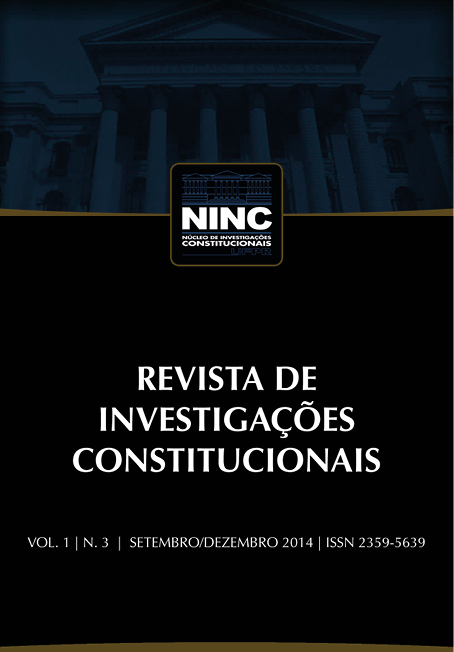Dialogical constitutionalism manifestations in the Brazilian judicial review
DOI:
https://doi.org/10.5380/rinc.v1i3.40515Resumo
The exponential growth in judicial review in Brazil, compared with the international scenery, is not out of tune – and it has a direct relation with many Brazilian constitutional features. An analytical text (with over 400 articles) and a large spectrum of fundamental rights, provide an ambience that favors highly intense controversy about State obligations in providing goods and public services, or even about the possible tensions that may arise between those same rights. The Brazilian Supreme Court faces that unmanageable number of lawsuits, notably related with claims regarding the non-granting of socioeconomic rights. That scenery is leading the Brazilian Supreme Court to some kind of experimentalism in the designing of its own rulings, applying techniques that can be easily associated with many manifestations of the so-called dialogical constitutionalism. All those experiences reveal that granting socioeconomic rights as a distributive justice goal requires a dialogic strategy in judicial review, in order to provide progressive implementation, preventing inequality. Still, those dialogic provisions face serious obstacles related with the menace of a merely symbolic use by the Judiciary and with a path of substitutive deliberation again by the Judiciary leading to reinforce Legislative inertia, social alienation from the debate and undermining democratic accountability. Adopting a dialogical constitutionalism model in Brazil might be a proper solution to allow its system to reach the functional development of the constitution’s goals – but it requires a deeper theoretical reflection.
Referências
ACKERMAN, Bruce. The living constitution. Faculty Scholarship Series, v. 120, n. 7, S.l., Harvard Law Review Association, p. 1738-1812, 2006.
BALKIN, Jack M. Framework. Originalism and the Living Constitution. Northwestern University Law Review, v. 100, n. 2, S.l.: s.n., p. 549-614, 2009.
BATEUP, Christine. Expanding the conversation: American and Canadian experiences of constitutional dialogue in comparative perspective. New York University Public Law and Legal Theory Working Papers, S.l.: s.n. p. 2-66, 2007.
_____. The Dialogic Promise-Assessing the Normative Potential of Theories of Constitutional Dialogue. Brookling Law Review, v. 71, S. l., New York University Public Law and Legal Theory Working Papers, p. 5-24, 2006.
CAMERON, Jamie. Dialogue and Hierarchy in Charter Interpretation: A Comment on R. v. Mills. Alta. Law Review, v. 38, n. 4, S.l.:s.n., p. 1051-1068, 2001.
DIXON, Rosalind. Creating Dialogue about Socioeconomic Rights: Strong-Form versus Weak-Form Judicial Review Revisited. International Journal of Constitutional Law, v. 5, n. 3, S.l., Oxford University Press and New York University School of Law, p. 391-418, 2007. Available at SSRN: http://ssrn.com/abstract=1536716 or http://dx.doi.org/10.2139/ssrn.1536716.
_____;GINSBURG, Tom. Deciding Not to Decide: Deferral in Constitutional Design (2011). International Journal of Constitutional Law, v. 9, n.. 389, Chicago, Law Working Paper, p. 636-672, 2011. Available at SSRN: http://ssrn.com/abstract=2085011
GARGARELLA, Roberto. We the People’Outside of the Constitution: The Dialogic Model of Constitutionalism and the System of Checks and Balances. Current Legal Problems, v. 67, n. 1, S.l., Oxford University Press, p. 1-47, 2014.
_____; COURTIS, Christian Courtis. El nuevo constitucionalismo latinoamericano: promesas e interrogantes. S.l.: CEPAL, 2009.
GRABER, Mark A. The nonmajoritarian difficulty: Legislative deference to the judiciary. Studies in American political development, v. 7, n. 01, USA, s.n., p. 35-73, 1993.
HOGG, Peter M.; THORNTON, Allison A.; Bushell; WRIGHT, Wade K.. Charter Dialogue Revisited-or Much Ado about Metaphors. The Osgoode Hall Law Journal, v. 45, n. 1, Canadá, s.n., p. 1-65, 2007.
_____; BUSHELL, Allison A. Charter Dialogue between Courts and Legislatures, The (Or Perhaps the Charter of Rights Isn't Such a Bad Thing after All). The Osgoode Hall Law Journal, v. 35, n. 1, Canadá, s.n., p. 75-124, 1997.
_____., THORNTON, Allison A.. Reply to Six Degrees of Dialogue. The Osgoode Hall Law Journal, v. 37, n. 3, Canadá, s.n., p. 529-536, 1999.
KAPISZEWSKI, Diana. Power Broker, Policy Maker, or Rights Protector?. In: HELMKE, Gretchen; RIOS-FIGUEROA, Julio. Courts in Latin America. S.l.: Cambrigde University, 2011. p. 154-186.
LECLAIR, Jean. Reflexions critiques au sujet de la me´taphore du dialogue en droit constitutionnel canadien [Critical reflections on the metaphor of dialogue in Canadian constitutional law]. Revue du Barreau, v. 63, p. 377-420, 2003. p. 379, 402–412.
MAINWARING, Scott. The transition to democracy in Brazil. Journal of Inter-American Studies and World Affairs, v. 28, n. 1, S.l.:s.n., p. 149-179, 1986.
MANFREDI, Christopher P. Judicial Power and The Charter: Canada and the paradox of liberal constitucionalism. 2 ed. S.l.: Oxford University, 2001.
_____; KELLY, James B.. Six degrees of dialogue: A response to Hogg and Bushell. The Osgoode Hall Law Journal, v. 37, n. 1, Canadá, s.n., p. 513-527, 1999.
MENDES, Conrado H. "Neither Dialogue Nor Last Word: Deliberative Separation of Powers III." Legisprudence, v. 5, n. 1, S.l.:s.n., p. 1-40, 2011.
_____. "Is it all about the last word? Deliberative separation of powers. Legisprudence, v. 3, n. 1, S.l.:s.n., p. 69-110, 2009.
MORTON, F. L.; KNOPFF, Rainer. The Charter Revolution & The Court Party. S.l.: Broadview, 2000.
POST, Robert, SIEGEL, Reva. Roe rage: democratic constitutionalism and backlash. Harvard Civil Rights-Civil Liberties Law Review, n. 131, S.l., Yale Law School Public Law & Legal Theory, Research Paper Series, p. 373-440, 2007.
_____. Democratic Constitutionalism and Cultural Heterogeneity. Australian Journal of Legal Philosophy, v. 25, n.2, S.l.:s.n., p. 185-204, 2000.
REHNQUIST, William H. Notion of a Living Constitution. Harvard Journal of Law & Public Policy, v. 29, n. 2, S.l.:s.n., p. 401-415, 2006.
SADEK, Maria Tereza; CAVALCANTI, Rosângela Batista. The new Brazilian public prosecution: an agent of accountability.In: MAINWARING, Scott; WELNA, Christofer. Democratic Accountability in Latin America. S.l.: Oxford Scholarship Online, 2003. p. 201-227.
SELCHER, Wayne A. A new start toward a more decentralized federalism in Brazil? Publius: The Journal of Federalism, v. 19, n. 3, S.l.:s.n., p. 167-183, 1989.
SHARE, Donald. Transitions to democracy and transition through transaction. Comparative Political Studie, v. 19, n. 4, S.l., Sage Publications, p. 525-548, 1987.
STRAUSS, David A. The living constitution. S.l.: Oxford University Press, 2010.
SUNSTEIN, Cass R. A Constitution of many minds: why the founding document doesn't mean what it meant before. S.l.: Princeton University Press, 2009.
_____. Constitutional agreements without constitutional theories. Ratio Juris, v. 13, n. 1, S.l:s.n, p. 117-130, 2000.
_____. Incompletely theorized agreements in constitutional law. Social research, v. 74, n. 1, S.l.:s.n., p. 1-24, 2007.
TREMBLAY, Luc B. The legitimacy of judicial review: The limits of dialogue between courts and legislatures. International Journal of Constitutional Law, v. 3, n. 4, S.l., Oxford University Press and New York University School of Law, p. 617-648, 2005.
VALLE, Vanice Lírio do. Judicialization of Socio-Economic Rights in Brazil: The Subversion of an Egalitarian Discourse. Available at SSRN 2031719 (2012).
Downloads
Como Citar
Edição
Seção
Licença
Autores que publicam nesta revista concordam com os seguintes termos:- Autores mantém os direitos autorais e concedem à revista o direito de primeira publicação, com o trabalho simultaneamente licenciado sob a Creative Commons - Atribuição 4.0 Internacional que permite o compartilhamento do trabalho com reconhecimento da autoria e publicação inicial nesta revista.
- Autores têm autorização para assumir contratos adicionais separadamente, para distribuição não-exclusiva da versão do trabalho publicada nesta revista (ex.: publicar em repositório institucional ou como capítulo de livro), com reconhecimento de autoria e publicação inicial nesta revista.
- Autores têm permissão e são estimulados a publicar e distribuir seu trabalho online (ex.: em repositórios institucionais ou na sua página pessoal) a qualquer ponto antes ou durante o processo editorial, já que isso pode gerar alterações produtivas, bem como aumentar o impacto e a citação do trabalho publicado (Veja O Efeito do Acesso Livre).
























